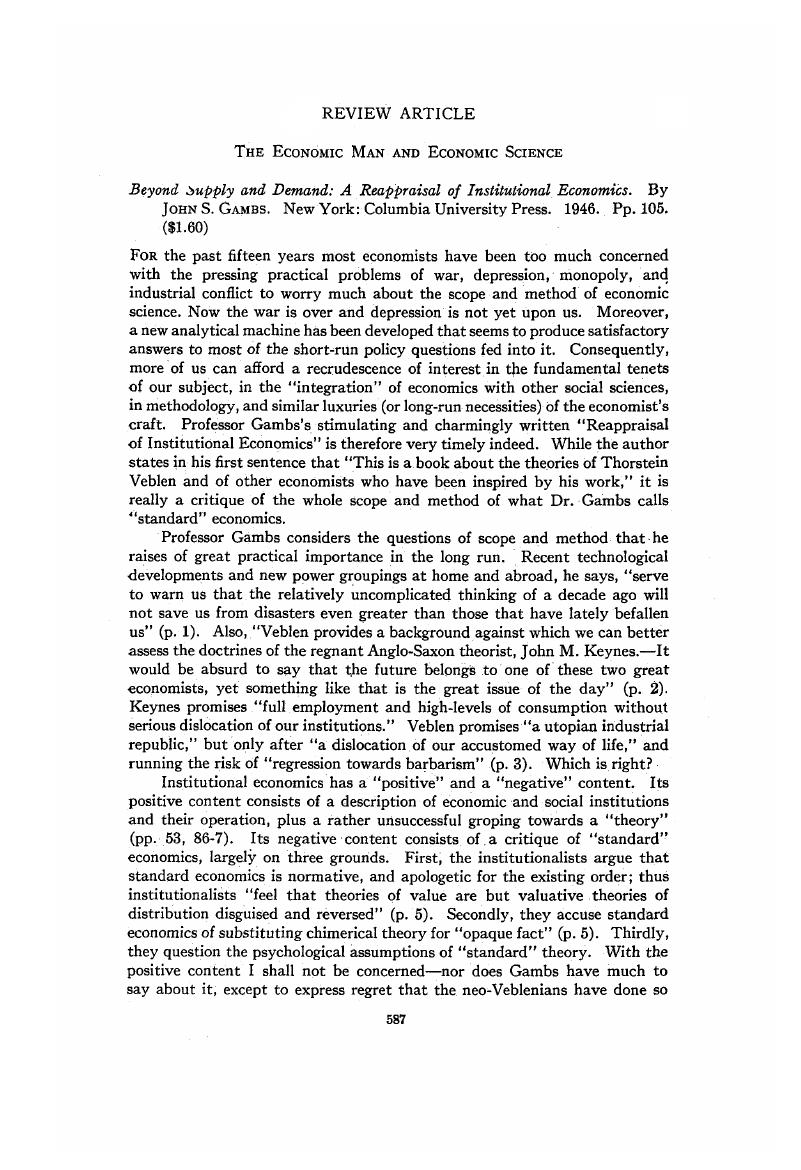Published online by Cambridge University Press: 07 November 2014

1 Dorfman, Vide Joseph, Thorstein Veblen and His America (New York, 1934), chaps. IV and VI-IX.Google Scholar
2 See, e.g., Schoenfeld, Leo, Grenznutzen und Wirtschaftsrechnung (Vienna, 1924), chap. IGoogle Scholar; Paul Rosenstein-Rodan on “Grenznutzen” in Handworterbuch des Staatswissenschaften; Robbins, Lionel, “The Relationship of Psychology to Economics” (Manchester School, 10, 1934)Google Scholar, and my reply (ibid., spring, 1935).
3 See, however, Boulding, K. E., “The Incidence of a Profits Tax” (American Economic Review, 09, 1944)Google Scholar and B. Higgins, “Elements of Indeterminacy in the Theory of Non-Perfect Competition” (ibid., Mar., 1939).
4 Cf. Higgins, B., “A Note on the Relationship of Psychology to Economics” (Manchester School, 05, 1935).Google Scholar
5 Cf. Higgins, B., “The Incidence of the Sales Tax” (Quarterly Journal of Economics, 08, 1940)CrossRefGoogle Scholar; and “Elements of Indeterminacy” (American Economic Review, 03, 1939).Google Scholar
6 For example, Woodworth, R. S.: “Psychology is a scientific study of the activities of the individual” (Psychology, New York, 1929, p. 3).Google Scholar
Munn, N. L.: “Psychology is the science of experience and behaviour” (Psychology, Cambridge, Mass., 1946, p. 16).Google Scholar
Guilford, J. P.: “Psychology is the science of the mental activity of organisms” (General Psychology, New York, 1939, p. 3).Google Scholar
Murphy, Gardner: “Psychology as a science studies interrelations between our experience and our behaviour” (General Psychology, New York, 1933, p. 4).Google Scholar
Cole, L. E.: “Scientific psychology seems to discover and record the measurable aspects of human conduct” (General Psychology, London, 1939).CrossRefGoogle Scholar
7 See Higgins, , “A Note on the Relationship of Psychology to Economics” (Manchester School, 05, 1935).Google Scholar
8 Most works hitherto published on the relationship of economics to psychology fall into one of the following categories: (1) those which denounce economics for its failure to take account of psychology; (2) those which apply a particular psychology to an analysis of economic behaviour; (3) those which analyse the social consequences of economic behaviour. Among the first of these groups are MacDougall and MacCurdy, eminent in the fields of social psychology and psycho-analysis respectively. In his preface to his Introduction to Social Psychology (Boston, 1926)Google Scholar, MacDougall upbraids the economists for failing to take into account psychological factors. For example, he maintained that economists had not explained prices because they had “neglected to take into account—suggestibility.” I think that even a generation ago economists knew that prices can be influenced by advertising. It is for MacDougall to explain suggestibility. The economist observes it, and deduces certain results.
MacCurdy, J. T., in his book Mind and Money (London, 1932)Google Scholar, begins by pointing out that the “homo economicus” is never found in reality, and that habits and the influence of the group may outweigh the profit-motive; an interesting but not startling confirmation of the economists' commonsense views of behaviour. He ends with the remarkable conclusion that Germany, with her unconscious ideal of race-suicide, is doomed to destruction; that the United States, being a typical adolescent, must lose all that is American to persevere; but that Great Britain, with her unconscious ideal of the Holy Warrior, will continue to rule the wavesmall of which is exceedingly interesting, but does not explain fluctuations in the value of money. At the same time, it must be said to MacCurdy's credit that he anticipated the Keynesians in so far as monetary policy is concerned. (Cf. pp. 252-3.)
9 Cf. Boulding, , “Incidence of a Profits Tax” (American Economic Review, 09, 1944)Google Scholar and Higgins, “Indeterminacy in Non-Perfect Competition” (ibid., Mar., 1939).
10 As one example of analysis of “coercion” by “standard” economists, see Dunlop, J. T. and Higgins, B., “Bargaining Power and Market Structures” (Journal of Political Economy, 02, 1942).CrossRefGoogle Scholar